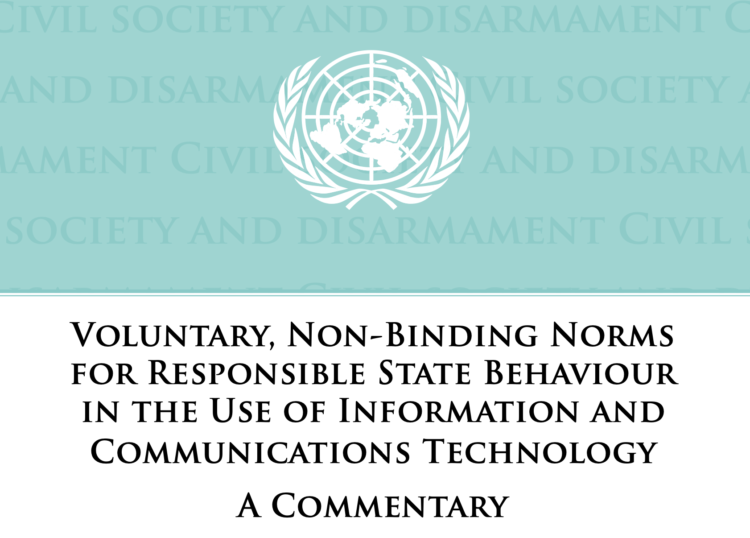
In June 2016 ICT4Peace co-launched with Leiden University’s Program for Cyber Norms a global open consultation on how to implement the Recommendations of United Nations’ Group of Governmental Experts on Developments in the Field of Information and Telecommunications in the Context of International Security (UNGGE 2015 Report), contained in paragraph 13 on Responsible State Behaviour in Cyberspace.
The project was lead by Dr. Eneken Tikk.
The Call for commentary and implementation guidelines can be found here.
In December 2017 The United Nations Office for Disarmament Affairs (UNODA) published the results of this Call in the following Publication: Voluntary, Non-Binding Norms for Responsible State Behaviour in the Use of Information and Communications Technology: A Commentary
ICT4Peace would like to thank the following contributors to this publication.
Kindly see the Preface by Dr. Eneken Tikk, Editor in Chief:
Preface
This commentary is a synthesis of views and perspectives. In an open call for comments, the editors invited scholars, experts and enthusiasts to submit recommendations, comments and guidance for understanding and interpreting the recommendations of the United Nations Group of Governmental Experts (GGE) on Developments in the Field of Information and Telecommunications in the Context of International Security. Most of the contributors and lead editors have never been exposed to the GGE process and have therefore taken the Group’s recommendations at face value.
More than 40 scholars and experts were involved in drafting this commentary, and these authors contributed their views on all or part of the recommendations in line with their respective areas of expertise, interest and experience. The lead editors then compiled and synthesized the contributions and added a broader contextualization and analysis of each recommendation.
Each chapter follows the same structure, beginning with a section that places one of the recommendations in the broader context of the 2010, 2013 and 2015 GGE reports and applicable national submissions.
In the background section that follows, commentators highlight various elements of the evolution and discussion of the issue(s) addressed in the recommendation in question. An expansion segment offers additional perspectives and approaches, feeding into further analysis. The chapter then concludes with proposals that, in the lead editors’ view, are essential for implementing the recommendation under consideration.
This publication does not claim to be exhaustive or even correct. Rather, it is a compilation of views intended to inform the implementation of the Experts’ brief and laconic guidance. Thus, the commentary presents possible means for the recommendations to be understood, emphasized and discussed. Accordingly, it should be regarded not as an authoritative document, but as an invitation to exchange views and perspectives in pursuit of a more uniform and common understanding of the issues and solutions that the 2014/2015 GGE addressed in its eleven recommendations.
This volume of the Civil Society and Disarmament series was prepared in cooperation with ICT4Peace, a policy and action-oriented international foundation that aims to save lives and protect human dignity through information and communication technology (ICT). Since 2004, ICT4Peace has explored and has championed the use of information and communications technologies (ICTs) and new media for peaceful purposes, including for peacebuilding, crisis management and humanitarian operations. Since 2007, ICT4Peace has promoted cybersecurity and a peaceful cyberspace through, inter alia, international negotiations with governments, international organizations, companies and non-state actors.
Eneken Tikk
Editor-in-Chief
and the Foreword by Daniel Stauffacher, President of ICT4Peace.
